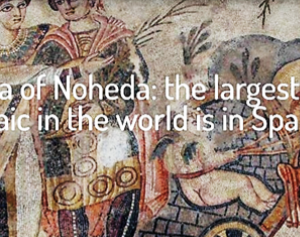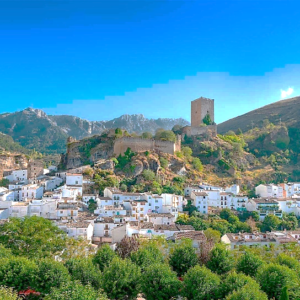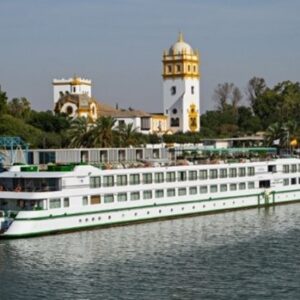
Almagro (Castille La Mancha) + historical cities in the Province of Jaén.
A 5-night tour: Sunday 25th – Friday 30th June 2023
Jaén is known as the World Capital of Olive Oil because it is the biggest producer of the oil, referred to by locals as liquid gold. It is also known – by historians – as the “Holy Kingdom” as long ago Jaén Province was a kingdom, ruled first by Moors and then by Christians.
DAY 1: SUNDAY 25th JUNE – Jávea / La Roda (254 km) / Amalgro (172 km)
08.30 hrs: Departure from the layby opposite Golden Star apartments, Calle Bruselas, Arenal.
08.45 hrs: 2nd pick up from Interiors, opposite side of the road, Jávea port. 3rd pick up at Mas y Mas, N332, if required. Refreshment break enroute.
12.45 hrs: Free time in La Roda, which has an interesting historic area with narrow streets and ancestral houses.

The 16th century Salvador Church has the Cultural Property designation and presides over the town. There are several palaces and stately houses, such as Dr. La Encina’s house, the Casa del Inquisidor and Lienzo de Doña Ana, with their beautiful façades.
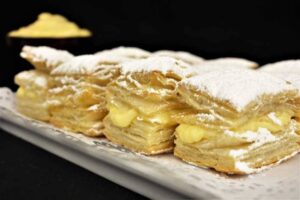
Be sure to try “miguelitos”, a puff pastry and cream sweet whose secret lies in its traditional production.



15.30 hrs: Reboard the coach and travel to Almagro.
17.30 hrs: Check in to the 4* Parador de Almagro (2 nights bed & breakfast). The Parador was originally a convent, dating from the 16th century, and is just five minutes from the Plaza Mayor.



Free evening.
DAY 2: MONDAY 26th JUNE
08.00 hrs: Breakfast; free day in Almagro.
Almagro has been declared an Historic-Artistic Site. According to tradition, the origin of the city was an Arab castle called Almagrib. The name refers to the characteristic red clay of the area, Almagro colour, which you will see in the Plaza Mayor and in other buildings of the historic centre.

Do not miss the Corral de Comedias de Almagro, the only one that has been preserved intact and active from the beginning of the 17th century to the present day.

The Palace House of Juan Xedler, or Almacén de los Fúcares, was ordered to be built by the Fugger family, who had achieved a great reputation as bankers, in the 16th century. The Fuggers used the enclosure as a storehouse for mercury extracted from the nearby Almaden mines. The decorations on doors, windows and stairs stand out. Renaissance columns and arches in a large square-shaped courtyard.

The National Theatre Museum is the only museum dedicated exclusively to the history of the theatre in Spain. Its collection offers a journey through the history of theatrical performance in Spain, from Greco-Roman theatre all the way through to the 20th-century avant-garde movements, and including medieval theatre, the Golden Age, Romanticism zarzuela and opera. There are over 8,000 works on paper, including stage and costume design, drawings, and prints, as well as collections of painting, sculpture, photographs (over 25,000 images since 1870), miniature models, programmes and costumes (over 2000 items of clothing since the late 18th century.

The medieval Plaza Mayor was redeveloped by the Fugger family.
09.15 hrs: Departure and travel to Bailén.
11.00 hrs: A visit to the olive oil cooperative, Picualia, regarded as one of the main contributors to the revolution that has shaken the olive-oil industry in recent years. It was created in 2009 when two experienced farm cooperatives, Agrícola de Bailén and Virgen de Zocueca, merged to create a powerful, modern oil mill. The name “Picualia” was chosen because the Picual olive is the members’ main crop. Of all the 2,600 types of olives found the world over, the Picual cultivar has the greatest number of healthy, antioxidant effects.




The Picualia project is not only based on offering high-quality Extra Virgin Olive Oils as the basis of a good diet and a key element of the Mediterranean diet; the company also creates products based on their olive juices and, in collaboration with local artisans from their territory, develops gourmet and healthy products.



Pure Extra Virgin chocolates from Picualia are bars with more than 18 flavours to choose from, in which pure cocoa and extra virgin cocoa merge to give an exquisite and 100% handmade product; flavours:
Strawberry, Raspberry, Olive seeds, Salty (with salt), Coffee with almonds, Orange, Meringue milk, Sugar free, Black with milk, Pure black (65% cocoa), White, Banana, Coconut, Violet petals, Spicy, Raisins to PX wine, Mint.
This is a 3-hour visit and will include:
A tour of Picualia’s facilities.
Guided tasting of the extra-virgin olive oil.
Special Picualia tasting menu in a selected restaurant.
14.30 hrs: Re-join our coach and travel to Úbeda (49 km)
15.30 hrs: Check in to the Parador de Úbeda (3 nights’ bed & breakfast).



Remainder of the afternoon/evening free.
The World Heritage City of Úbeda is in the province of Jaén with the Parador located in the old quarter, housed in a 16th-century palace of Renaissance-style. Just a short stroll separates the Parador from some of the loveliest buildings in Úbeda, including El Salvador Chapel, the palace of the Marquis of Mancera and Vázquez Molina Palace, now home to the city hall. The city’s wealth of cultural heritage is reflected in its walls, palaces, churches, monasteries and convents. Úbeda benefitted from extensive patronage in the early 16th century resulting in the construction of a series of Renaissance-style palaces and churches, which have been preserved ever since.

The Vázquez de Molina square contains the most emblematic buildings of the town, such as the old Granary, the Bishop’s prison, the Vázquez de Molina Palace (current City Hall), the Palace of Deán Ortega, the Sacra Capilla del Salvador…
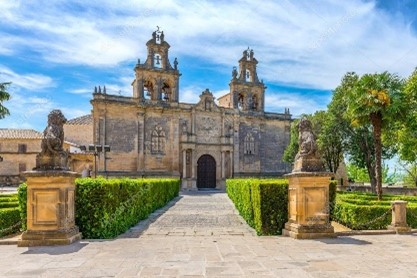
and the Basilica of Santa María de los Reales Alcázares. The basilica hides some treasures such as the tiny image of the Virgin of Guadalupe – patron saint of the city – or the terrace of the sacristy from which you can see the famous “hills of Úbeda”.
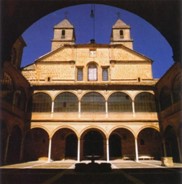


The Hospital de Santiago, declared a National Monument in 1917, is one of Úbeda’s most important works, carried out in the 16th century. In addition to the hospital, the architect built a chapel, a palace and a family pantheon, which has sometimes led to it being called the Andalusian Escorial.


The Synagogue of Water was discovered by chance by the businessman Fernando Crespo during a real estate project in what was previously a ladies’ hairdresser. The Jewish Synagogue dates from the 14th century and is composed of six unique spaces that include the ritual bathing room of purification or Mikveh, a space dedicated to the ritual baths of purification so common in Jewish customs; the Women’s Gallery, a place occupied by women during ceremonies and rituals hidden behind lattices; the room “Del Inquisidor”, with its patio, cellar and ovens. (It is suggested that you prebook online if you wish to visit)
DAY 4: WEDNESDAY 28TH JUNE – Úbeda / Jaén (61 km)
08.00 hrs:Breakfast
09.00 hrs: Join the coach and travel to Jaén.
10.00 hrs: Free day in Jaén (declared a UNESCO World Heritage Site in 2003). Jaén is known for its olive oil production and for its fortresses, including the medieval Castillo de Santa Catalina which houses the Parador de Jaén. It is not possible for the coach to access the castle so if you wish to visit this site you will need to organise your own transport by taxi.






The cathedral is home to the Holy Veil which according to tradition, was used by Saint Veronica to wash Christ’s face. The Villardompardo Palace (16th-century) was found to conceal beneath it some Arab baths dating from the 11th century. These baths were declared a National Monument in 1917. They are known as the Baños de Alí (Ali’s baths) and are considered the most important in the city. They were an important place for personal hygiene, but also for social life. They were laid out in four different rooms: the marble lobby with red and white arches, then the cold room and the warm and hot rooms. There were boilers next to the hot room that filtered the heat through a system of shafts placed between the rooms’ walls. The floor of the room is supported on three brick pillars, allowing hot steam to circulate. Today they house the Manuel Moral International Museum of Naïf Art and the Museum of Arts and Popular Traditions. It was declared a Historic and Artistic Monument in 1931. The Arab Baths Cultural Centre reopened in 2014 and now offers a varied programme of exhibitions, concerts, lectures and demonstrations.
15.00 hrs: Reboard coach and return to Úbeda. Remainder of the afternoon/evening free.
DAY 5: THURSDAY 29TH JUNE – Úbeda / Baeza (13 km)
08.00 hrs: Breakfast.
09.00 hrs: Travel to Baeza.
09.30 hrs: Free time in Baeza, also a UNESCO World Heritage Site. At its heart is the combined Plaza Mayor and the paseo which is flanked by pavement cafes.

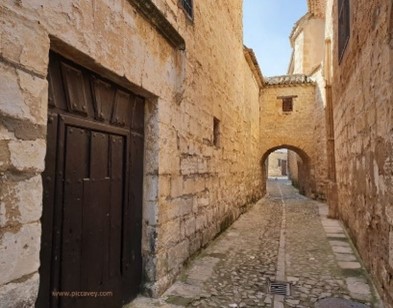
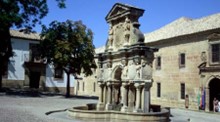
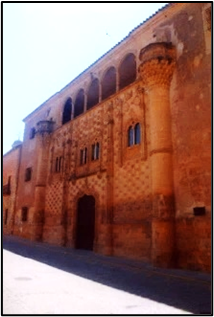
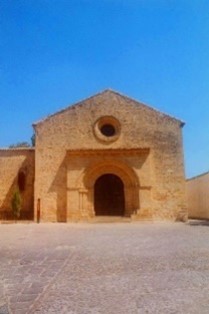

14.30 hrs: Re-board our coach and return to our hotel.
The rest of the afternoon/evening free.
DAY 6: FRIDAY 30TH JUNE – ÚBEDA / ALCARAZ (125 km) / JAVEA (297 km)
08.00 hrs:Breakfast
09.00 hrs: Load luggage on to coach and departure for Alcaraz.
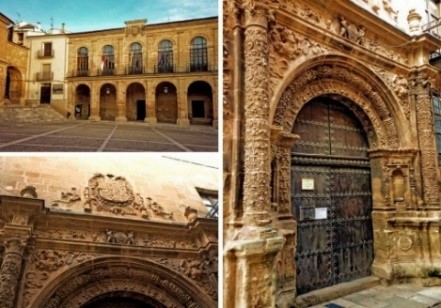
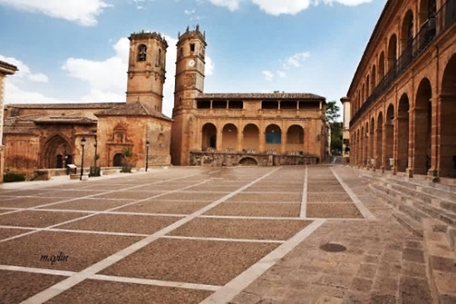
Alcaraz is an “Historic-Artistic” site for its monuments and the surrounding mountain scenery. It was once an Arab town and was also an important town at the time of the Reconquest. Wealth came with a flourishing carpet industry, since gone. The heart of Alcaraz is its 16th century Renaissance square, the Plaza Mayor, flanked by the Trinidad and El Tardón towers; it is one of the most beautiful in Spain and has arcades on three of its sides. Nearby is the Lonja del Corregidor, an 18th century exchange market, with Plateresque decoration. The church of the Holy Trinity is Gothic in style and dates from the 14th and 15th centuries. As well as its distinctive tower it also has a cloister which was built in Renaissance style. At the highest part of Alcaraz you will find the walls from its 13th century castle. There are other interesting buildings to be seen, such as the María Magdalena Convent but the best thing is to wander through its narrow streets.
11.00 hrs: Free time in Alcaraz.
14.30 hrs: Reboard our coach and travel to Jávea (refreshment break enroute).
19.00 hrs: Approx. arrival time in Jávea.
PLEASE NOTE: We regret that this tour is not suitable for anyone with a walking disability and members will need to be able to manage their own luggage. Although the Parador de Ubeda has lifts, it is housed within a palace and there are some steps inside the building.
What is included
Coach transport
2 nights’ accommodation in the 4* Parador de Almagro (breakfast included).
3 nights’ accommodation at the 4* Parador de Úbeda (breakfast included)
Guided visit to the olive oil cooperative, Picualia, with tasting menu.
Gratuities.
Group insurance policy.
Cost: sharing twin/double room: €495 per person; room for sole occupancy €725 per person.
We will be collecting payments as follows:
1st November: deposit of 200 euros per person
1st March: final balance
When making payment by bank transfer, please use the reference JAEN along with your name.
DISCLAIMER: The Jávea U3A is not liable in any respect for any loss or injury that may be suffered by members whilst participating in the Association’s activities. Please be aware that you are responsible for your own personal belongings at all times.
CANCELLATION: In case of cancellation of your booking, refund of deposit/other payments can only be made if your place is sold on to another member/s of the Javea U3A.
Group Leaders: Angela and Tony spanish.culture.cuisine@u3ajavea.com

